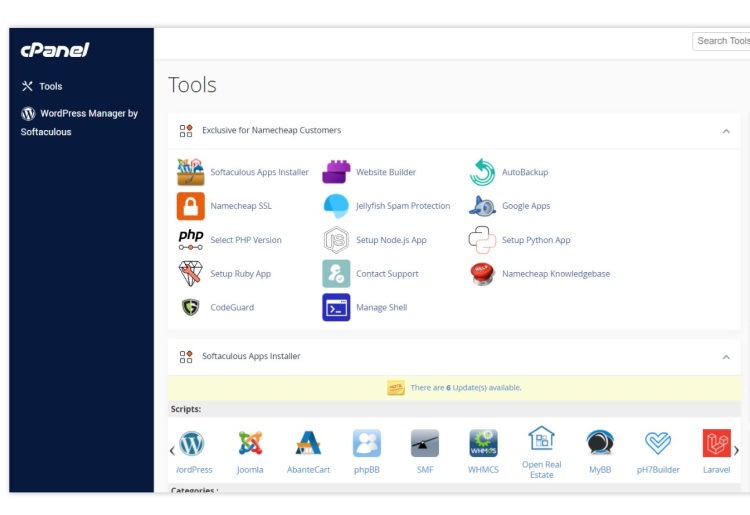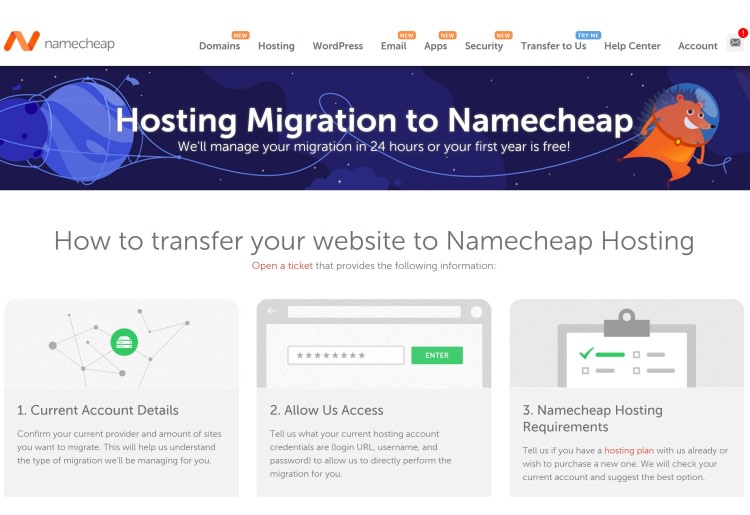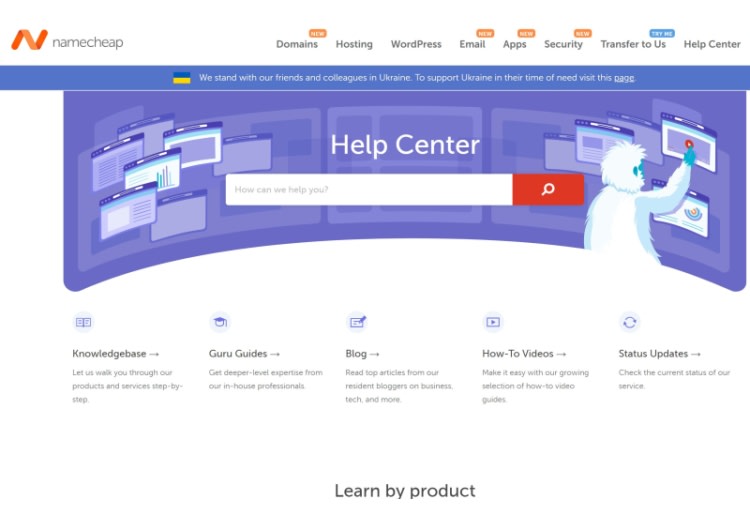In a Nutshell
pros
- Affordable pricing
- User-friendly interface
- Free website migration
cons
- No phone support
- Shared plans provide free SSL for the 1st year only
Namecheap at a Glance
Simple Setup
Technical Features
Security Features
Customer Service
Servers
Overview
Namecheap at a Glance
What is Namecheap?
Namecheap is a domain registrar and website hosting company. Geared primarily towards individual users, freelancers, and small- to medium-sized businesses, it offers a variety of hosting solutions, from shared to reseller and dedicated server hosting.
Namecheap aims to simplify the often-complex world of website management, providing intuitive tools and dashboards that remove the barriers to entry for those less technically inclined.
Namecheap features
Shared hosting
Namecheap's shared hosting plans cater to beginners and offer a cost-efficient way to get your website live. In a shared hosting environment, your website shares server resources like CPU, RAM, and storage space with other websites. This can affect your website performance at times, but shared hosting is a practical starting point for personal projects or small businesses.
WordPress hosting
Namecheap's WordPress hosting, also known as EasyWP, is specifically designed to streamline your WordPress experience. Each plan includes routine backups plus malware scanning to keep your WordPress website secure and operational.
Reseller hosting
If you're a web designer or developer looking to add hosting to your list of services, Namecheap's reseller hosting is worth considering. Tailored tools for billing and client management simplify running your own hosting business, allowing you to offer a comprehensive service to your clients.
VPS hosting
For those needing a bit more flexibility and control, Namecheap offers virtual private server (VPS) hosting plans that provide a cost-effective approach to managing multiple websites. A VPS hosting plan provides you with allocated resources that ensure your website’s performance. This type of hosting is well-suited for more complex websites requiring scalability.
Dedicated hosting
For businesses requiring top-notch performance and dedicated resources, Namecheap's dedicated hosting plans are the go-to choice. These plans provide you with dedicated hardware so that your website performs optimally.
Security, reliability, and uptime
Namecheap provides two-factor authentication (2FA) for accounts. There are also options in its hosting packages for malware scanning, spam prevention, and protection against distributed denial-of-service (DDoS)—a kind of cyber attack.
In terms of reliability, Namecheap considers its 99.9% uptime guarantee a minimum service level, with an expectation that actual uptime is nearer 100%. This should give you the peace of mind that your websites will be accessible when needed.
If you register your domain with Namecheap, you’ll also get free domain privacy protection. This ensures that your personal information is always hidden, reducing risks of data exposure or phishing attacks.
Speed and performance
The speed and performance you experience will depend on the type of hosting you choose. VPS and dedicated hosting plans, where you’re allocated specific resources, have higher performance than budget shared-hosting packages.
That said, I found the shared hosting plans faster than many comparably priced plans. Namecheap offers unmetered bandwidth, and even the plans on the lowest tiers come with a minimum of 10GB of storage.
Technical specifications
Namecheap’s servers use Intel(R) Xeon(R) CPUs and fast SSD storage to ensure optimal performance. The hosting platforms run on Linux, with cPanel available as standard on the shared hosting plans. Content delivery network (CDN) support is available to further improve your site's performance and reliability, with Supersonic CDN available as a paid extra.

Website builder
Namecheap provides a user-friendly website builder tool. It’s designed to simplify the process of website creation for users at all skill levels. This drag-and-drop editor offers a variety of customizable templates, making it easier than ever to create a professional-looking website without needing any coding experience.
Free website migration
Namecheap’s migration service allows you to transfer your existing website from another hosting provider at no additional cost. It also aims to alleviate the technical challenges often associated with this task, making it easier for you to make the switch.

Is Namecheap Safe and Reliable?
Yes, I’ve found Namecheap to be one of the more reliable hosts that I have used. You’ll find the usual safety features as standard, such as SSL certificates, which are necessary to prevent modern web browsers such as Chrome from marking your website as unsafe to your users.
You’re also protected against DDoS attacks, where someone tries to take your website offline by using a flood of internet traffic to overwhelm its hosting. Namecheap helps your website stay functional and online in the event of such a cyberattack.
You can secure your account with two-factor authentication, using either a specialized USB or near-field communication (NFC) device or a timed one-time password (TOTP). I’d recommend only choosing web hosting companies that offer two-factor authentication due to how difficult it is to recover your website and domain name if your account is stolen.
How Namecheap Works
Namecheap operates on a straightforward principle: to make web hosting and domain management as easy to use as possible. After signing up, you’ll go to a user-friendly dashboard where you can control all aspects of the hosting of your website.
Options are clearly laid out, making it easy to set up a new website, install SSL certificates, restore your site from a backup, or alter billing and security options through your account settings. You can also add extra services and features with just a few clicks, streamlining the entire process.
How To Get Started With Namecheap / How To Sign Up for Namecheap
Signing up is straightforward. You create an account, choose your domain and hosting plan, and away you go. You’ll be walked through the information you need to provide, such as your postal address, phone number, and billing details. Namecheap has put a lot of thought into the user onboarding process, making it streamlined, easy to follow, and accessible to users of all levels.
After signing in, you’ll find yourself in the Namecheap dashboard where you can install software such as WordPress and enable additional features to suit your needs. The platform is designed to be intuitive, even for those who aren't tech-savvy, and if you get stuck, Namecheap provides video guides to help you get started.
Namecheap Customer Service
You can reach out to customer service via live chat or email. Namecheap’s hours of operation are 24/7, and if you opt for chat, you'll be interacting with a person rather than a bot.
Some users have reported slower responses during peak hours, for example waiting over 15 minutes to connect, with long waits between replies from the customer service agent. However, I only had to wait a couple of minutes to be connected to someone, and the agent I spoke to was helpful and answered my questions quickly.
Namecheap also offers a comprehensive range of supporting documentation, like FAQs and a knowledge base, to help you navigate its services. These contain most of the information you need for managing your account, understanding cPanel, and so on.
Namecheap’s website also features blog posts and guides covering more general topics, such as explaining what a custom domain is and how to create a marketing plan for your business. I particularly like Namecheap’s video guides, which provide step-by-step guidance on how to use the service.

How To Cancel or Pause a Namecheap Subscription
If you decide that Namecheap isn't for you, canceling your subscription is relatively straightforward. Just navigate to your account settings and follow the instructions. You can complete this in just a few clicks. You also have the option of disabling auto-renewal, as well as being able to cancel immediately and have all the data erased simultaneously.
Is There a Namecheap App?
Yes, Namecheap offers a mobile app for both Android and iOS, although it’s geared towards managing your domain registrations rather than hosting settings. The app itself is cleanly designed and easy to use, but most users would find it limiting compared to managing hosting through the web interface.
Namecheap Pricing
How Much Does Namecheap Cost?
Namecheap’s plans are budget-friendly and provide a variety of options to suit different needs. The shared and WordPress hosting plans are available in three tiers, with the middle tier often presenting the best value for money. For businesses or more advanced users, Namecheap offers reseller, VPS, and dedicated server plans.
Shared Hosting
Cost per month
$4.48
$6.48
$9.48
Introductory price (cost per month)
$1.48
$2.38
$4.98
Hosted domains
3
Unlimited
Unlimited
Disk space
20GB SSD
Unmetered SSD
50GB SSD
Bandwidth
Unmetered
Unmetered
Unmetered
Email accounts
30
Unlimited
Unlimited
WordPress Hosting
Cost per month
$6.88
$12.88
$19.88
Introductory price (cost for the year)
$19.55
$37.95
$45.95
Hosted sites
1
1
1
Disk space
10GB SSD
50GB SSD
100GB SSD
Monthly visits
50K
200K
500K
Reseller Hosting
Cost per month
$19.88
$39.88
$58.88
cPanel accounts
25
100
150
Disk space
30GB
90GB
150GB
Email accounts
30
Unlimited
Unlimited
VPS Hosting
Cost per month
$9.88
$15.88
$28.88
CPU cores
2
4
8
RAM
2GB
6GB
12GB
Disk space
40GB SSD
120GB SSD
240GB SSD
Bandwidth
1000GB
3000GB
6000GB
If you’re an advanced user, or looking to set up your own white-label hosting business, then you already know whether you need reseller or VPS hosting. Namecheap also provides dedicated server packages, although these start at $639.88 per year.
For most users, Namecheap’s shared hosting is a good choice. I’d recommend the Stellar Plus plan here. If you’re sure you’ll only use WordPress for your website, then the EasyWP Turbo plan is also a good choice. Namecheap’s pricing is not the lowest you’ll find out there, but it is at the lower end of the scale and includes some options, such as automated backups, that pricier competitors charge extra for.
What can you do with Namecheap for free?
Namecheap offers a 30-day free trial of its WordPress hosting. The trial is limited to one household or business and is considered a purchase. This means if you use the trial, you’re not eligible for the introductory pricing available on other plans.
There’s also the option of trying Namecheap’s website builder tool for free. This trial lasts 14 days and allows you to design a site using basic themes and a placeholder domain.
Optional add-ons
Namecheap offers a large range of customizations and add-ons to help you tailor your hosting to your needs:
- Dedicated IP address ($4/month): A unique numeric address exclusively assigned to your account.
- Domain names (from $0.98/year): Purchase a domain name for your website.
- SiteLock website security ($4.88-$7.88/month): Additional malware scanning and removal.
- SSL certificates (from $5.99/year): Namecheap’s SSL certificates are free for the 1st year only
- Supersonic CDN ($8.88-$38.88/month): Improve your website delivery speeds and protect your site from DDoS attacks.
- UK-based hosting ($1/month): Host your website in the UK for an additional fee.
Namecheap Alternatives
How Does Namecheap Compare to Other Hosting Brands?
Price per month
From $1.48
From $2.75
From $1
From $1.99
Bandwidth
Unmetered
Unmetered
Unmetered
Unmetered
Special offer
Introductory pricing
Free domain for 1st year
Free domain for 1st year
Free domain for 1st year
Uptime
99.9%
99.99%
99%
99.9%
Website builder
Yes
Yes
Yes
Yes
Money-back guarantee
30 days
30 days
30 days
30 days
Namecheap vs Bluehost
While both Namecheap and Bluehost have WordPress plans, Bluehost is officially recommended by WordPress.org, which means it's optimized specifically for WordPress websites. Namecheap, however, stands out for its lower entry-level pricing and free domain privacy protection.
Namecheap vs HostGator
Namecheap and HostGator are both popular choices for web hosting services. HostGator offers seamless upgrades to higher-tier plans or specialized hosting solutions as your website grows. However, Namecheap might be the better choice if you’re managing small- to medium-sized websites.
Namecheap vs IONOS
IONOS offers strong performance and is well-suited for businesses with a focus on the European market. Namecheap tends to be more affordable and user-friendly, particularly for individual users or small businesses. However, IONOS also provides phone support, which may make it a better choice for some users.
Bottom Line (Is Namecheap Worth It?)
Namecheap is one of the leading domain registrars, and its web hosting is well thought out. The range of plans compares well with its competitors, but what sets Namecheap apart is its focus on making hosting accessible and affordable without skimping on essential features. From the moment you sign up, Namecheap offers an intuitive user interface and dashboard where you can manage your hosting settings.
If you're looking for highly specialized or enterprise-level hosting solutions, you might find Namecheap a bit limiting—and you’d miss out on the 24/7 phone support offered by some competitors. However, the excellent knowledge base and the live chat provide ample support for most people. Overall, if you’re a personal user, a freelancer, or running a small business, Namecheap is worth considering.